Lancashire grammar schools 11 plus guide

Are you considering a grammar school in Lancashire for your child? We’ve collated everything you need to know about admissions in 2025–2026. Keep reading to:
- Find out more about grammar schools in Lancashire
- Learn about 11 plus exams in Lancashire
- Discover which subjects your child will be tested on
- Plus, get exclusive resources to help your child prepare!
Which schools in Lancashire use the 11 plus?
There are four grammar schools in Lancashire. If you would like your child to be considered for a place at any of these schools, they will need to take the school’s entrance exam (11 plus).
- Bacup and Rawtenstall Grammar School (boys and girls)
- Clitheroe Royal Grammar School (boys and girls)
- Lancaster Girls’ Grammar School (girls)
- Lancaster Royal Grammar School (boys)
Dates for your diary
The admissions dates in Lancashire are specific to each school. Lancaster Royal Grammar School has yet to confirm admissions dates for 2025–2026.
- April 2025: exam registration opens for Bacup & Rawtenstall Grammar School
- Monday 2nd June 2025: exam registration opens for Clitheroe Royal Grammar School and Lancaster Girls' Grammar School
- Monday 8th September 2025: exam registration closes for Lancaster Royal Grammar School
- Friday 12th September 2025: exam registration closes for Bacup & Rawtenstall Grammar School, Clitheroe Royal Grammar School and Lancaster Girls' Grammar School
- Saturday 27th September 2025: 11 plus exams take place at Lancashire grammar schools
- Mid-October 2025: parents receive 11 plus results
- Friday 31st October 2025: national deadline to apply for school places
- Monday 2nd March 2026: national offers day
What is the 11 plus?
The 11 plus is an academic entrance exam used by grammar schools in England. Schools use the results of the test to decide which children to offer places to in Year 7.
The test is designed to be challenging. Grammar schools use the 11 plus to select children working in the top ability range in their year group. Children who are working at least within the top 25% of their year group – normally ‘exceeding expectations’ in Key Stage 2 English, maths and science – are usually well-suited for grammar school.
The exam takes place in September in Year 6. Children who were born between 1st September 2014 and 31st August 2015 will take the entrance test in September 2025 for Year 7 entry in September 2026.
What's on the Lancashire 11 plus?
The grammar schools in Lancashire use different 11 plus providers.
GL Assessment
GL Assessment is the 11 plus exam provider for Bacup & Rawtenstall Grammar School, Clitheroe Royal Grammar School and Lancaster Royal Grammar School. These three schools test English, maths and verbal reasoning.
GL Assessment papers take around 45 minutes to one hour to complete (per paper), with a break in between. All GL Assessment 11+ questions are multiple-choice. Your child will have separate pre-printed answer sheets, which they will use to mark the answer(s) they think are correct.
FSCE
Future Stories Community Enterprise is the 11 plus exam provider for Lancaster Girls Grammar School. This exam tests Key Stage 2 content up to the end of Year 5. For more information, visit our guide to FSCE 11+ exams.
Is your child ready for the 11+?
See where they stand in minutes. Atom’s free 11+ baseline tests give you an instant breakdown of their strengths and gaps. Know exactly what to focus on next and start preparing with direction, not uncertainty.
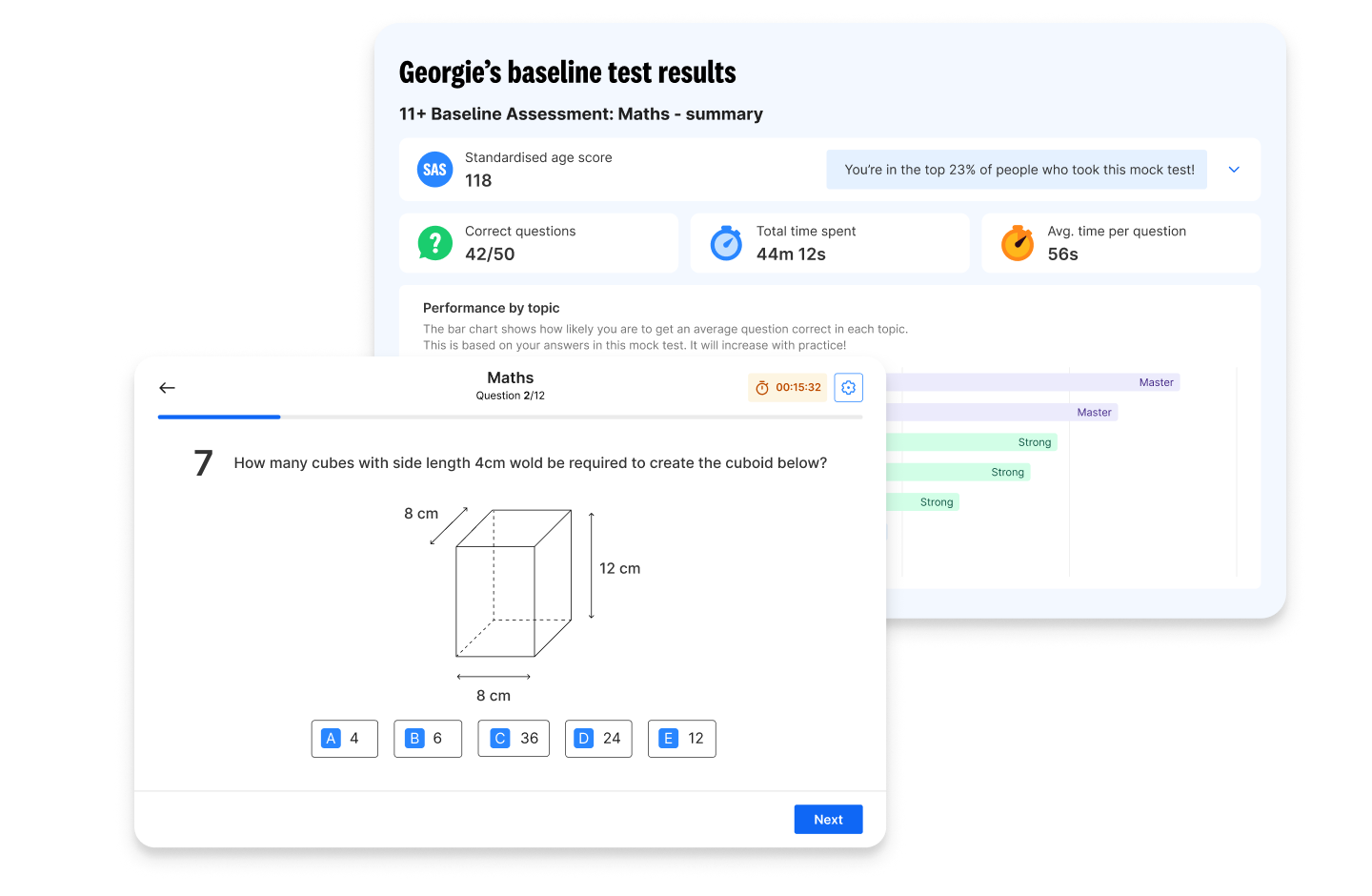
How is the 11 plus scored?
After the test, your child’s answer sheets are marked using Optical Mark Recognition (OMR). This technology picks up the marks your child has made to indicate which answers they think are correct. Your child receives a mark for every correct answer.
These marks are then age-standardised. Age-standardisation is a common practice in 11 plus scoring and ensures younger children aren’t disadvantaged.
Standardised age scores for each paper normally range from 60 at the lowest end, to 142 at the highest end.
- A single standardised score of 80 or below represents the bottom 10% of the year group
- A single standardised score of 100 represents the average score for the child's year group
- A single standardised score of 120 or above represents the top 10% of children in that year group
The highest standardised age score a child can achieve for a single paper is usually 142. This score would place them within the top 1% of children taking the test.
You’ll receive your child’s results in mid-October. If your child meets your target school’s qualifying standard, you can then apply for a place for that school on your common application form (CAF).
What's the pass mark for the Lancashire 11 plus?
There is no single pass mark for the Lancashire grammar schools’ entrance test. All children’s standardised scores are placed in rank order, and each school will decide on a ‘qualifying standard’. ‘Looked after children’ and ‘previously looked after children’, along with children who are eligible for Pupil Premium, tend to be prioritised for places and might need to achieve a slightly lower qualifying score to get offered a place at a Lancashire grammar school.
Every grammar school has different admissions criteria. We’ve included the admissions criteria for each Lancashire grammar school below:
- Bacup and Rawtenstall Grammar School
- Clitheroe Royal Grammar School
- Lancaster Girls’ Grammar School
- Lancaster Royal Grammar School
How to apply to Lancashire grammar schools
If you're considering a grammar school in Lancashire for your child, it's a good idea to speak to your child's teacher first.
Grammar schools are academically-selective and select children working towards the top of their year group. Your child's teacher will be able to indicate whether they think your child will be able to keep up with the pace in a grammar school.
1. Register for the Lancashire 11 plus
If you would like your child to be considered for a place at one of the four Lancashire Grammar Schools, you’ll need to register them to take the school’s entrance test.
Registration will be available on your target school’s website. In Lancashire, the registration window is usually open from May/June in Year 5 to early September in Year 6.
2. Apply for school places
Your child’s test results will be sent to you in mid-October. You’ll find out if your child has met the qualifying standard to be eligible for a place at your target school(s).
You can use these results to decide which schools to name on your secondary school common application form. Before listing a school on your form, check its admissions policy and make sure your child is eligible.
The application form must be submitted to your home local council by 31st October 2025.
3. National school offer day
On 2nd March 2026, you will find out which school your child has been allocated a place at. They will be allocated a place at your highest-preferred school for which they meet the entry criteria and which has places available.
If no places are available at your preferred schools, they will be offered a place at another school in your area. You can appeal via an independent panel. Information about how to appeal will be sent to you by your local authority along with your school offer on National Offers Day.
How can I help my child prepare for the Lancashire 11 plus?
The 11 plus exam is designed to be challenging. Here are our top tips to help your child prepare for the 11 plus in September 2025.
Bitesize learning
It’s important to build a good knowledge base before the 11 plus. Using a ‘little and often’ approach when learning is key – our brains encode new information more effectively when dealing with smaller ‘chunks’ of information. For children aged 10–11, child psychologists recommend regular study sessions of 20–30 minutes.
Atom Home makes learning a more enjoyable process for your child. They'll explore exciting worlds full of interactive questions, earning coins to spend in the Atom shop. Atom adapts to your child, showing them questions at just the right level of difficulty to keep them motivated.
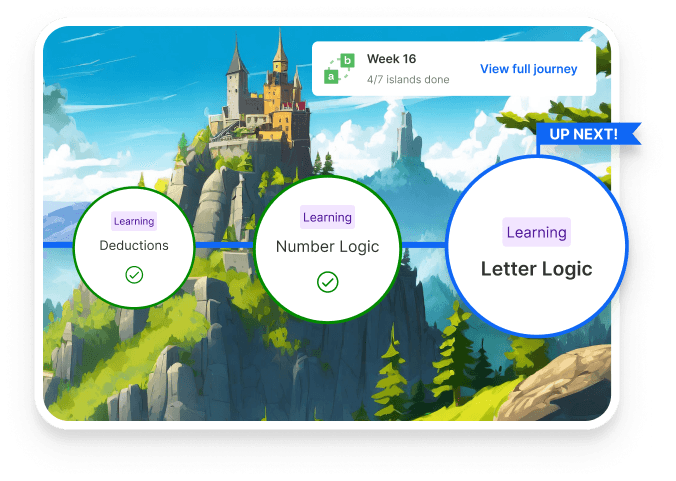
Read widely
11 plus exams test your child’s ability to analyse and interpret written information. Regular reading is a great way to help your child build these skills.
Encourage them to read books from different genres and by a diverse range of authors. Increasing the variety of your child’s reading will help them understand different styles, tones and purposes. Meanwhile, reading a little every day will help widen their vocabulary, sharpen their analytical thinking, and enhance their imagination.
Refine exam technique
When your child feels confident with the topics they’ve learnt in Year 5, they’ll be ready to put their knowledge to the test.
Practice tests can help your child develop problem-solving skills and build confidence working under test conditions. They’re also a great way to consolidate learning and highlight knowledge gaps for further improvement.
With Atom Home, you'll unlock online mock tests and printable practice papers for the Lancashire 11 plus. Enjoy automatic marking and progress tracking with the online tests, and help your child get familiar with the real exam experience with printable practice papers.
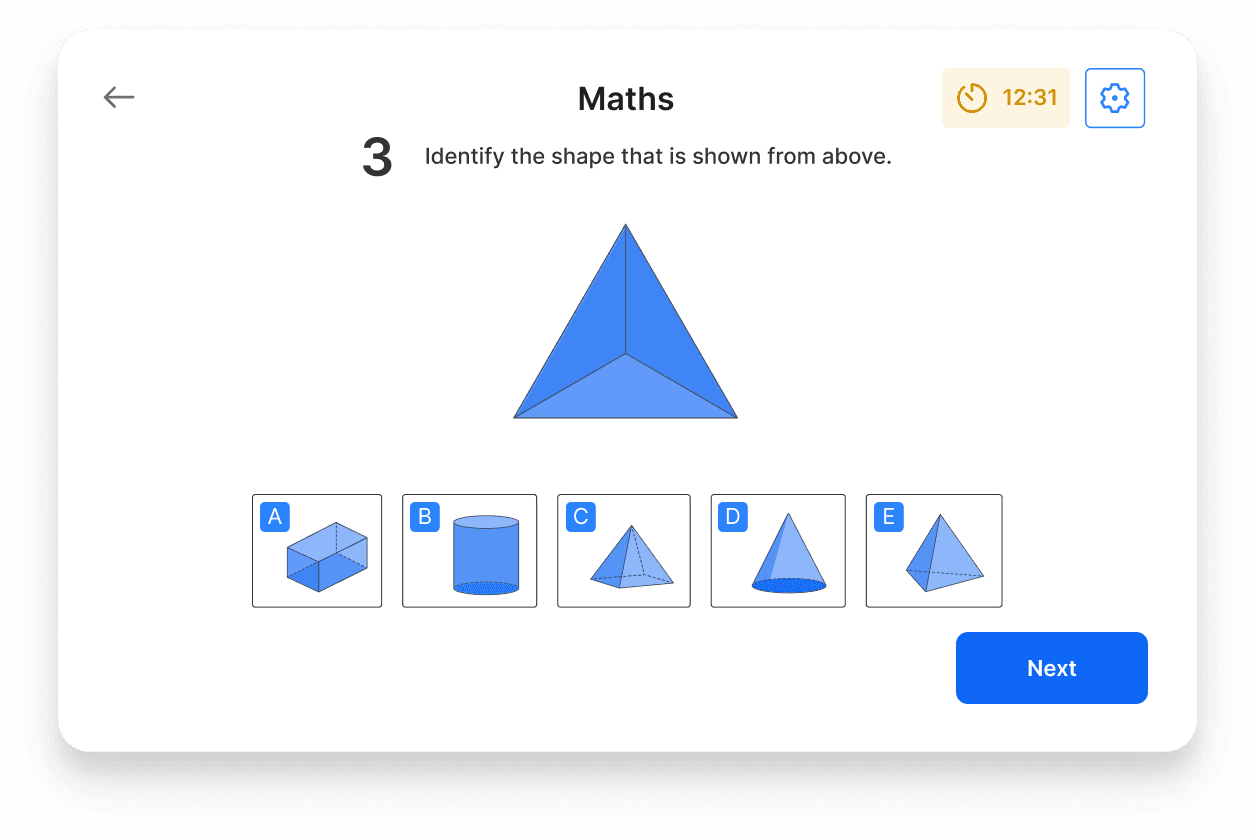
Celebrate progress
Setting regular, achievable goals and celebrating your child’s progress – no matter how big or small – will help keep their motivation high.
Make sure to encourage a growth mindset. This means celebrating effort, as well as achievement! When your child makes mistakes or struggles to understand a particular topic, help them understand that they’ll improve through practice. Regular praise will help your child improve their resilience when tackling new and challenging topics.
Take control of your child’s 11+ preparation.
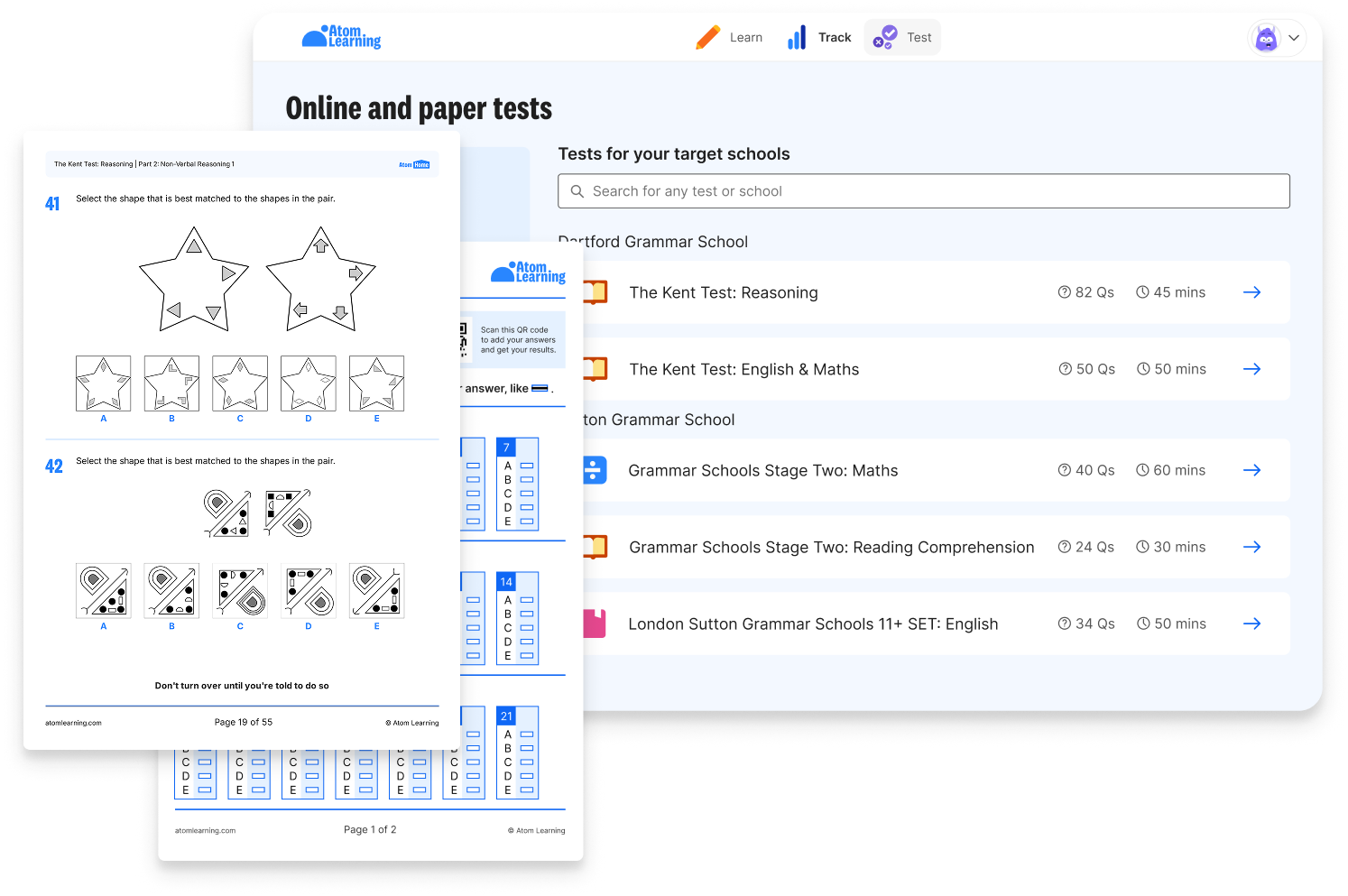
Not sure if your child is on track for the grammar school 11+? You don’t need to guess what to cover or whether they’re ready. Atom shows you exactly what to practise each week and how they’re performing, so you can stay ahead of the process without the stress.
- Follow personalised weekly exam plans that show them what to learn next.
- Download replica 11+ practice papers and upload a photo for instant, stress-free marking.
- Track progress and see how they compare to others applying to the same schools.
Start your free trial and help your child feel fully prepared for the 11+.


